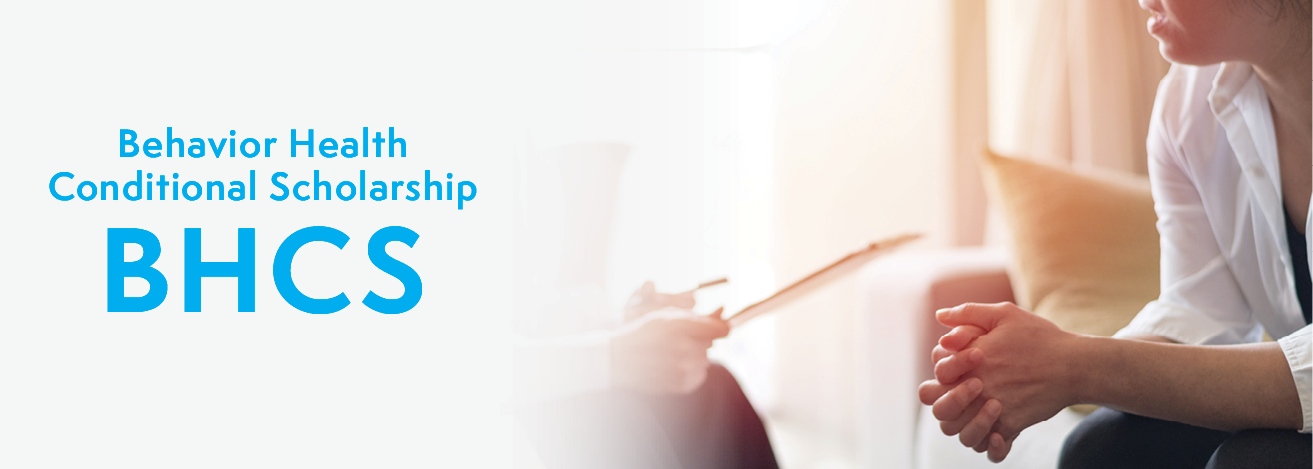
Overview
HB 1946 was designed to address the behavioral healthcare professional shortage by providing financial aid to those pursuing a career in behavioral health. The Behavioral Health Conditional Scholarship requires three to five years of Post Graduation Service Obligation (PGSO) in exchange for receiving an award. The award will be distributed over a maximum of three years for program completion.
Applications for the 2026-27 academic year have now closed. Updates for the 2027-28 application cycle will be announced in late 2026.
Eligible program types
Eligible M.A. Programs
- Clinical Mental Health Counselor
- Social Work
- Marriage and Family Therapy
- Applied Child & Adolescent Psychology
- Counseling Psychology
Eligible Certificate Programs
- Substance Use Disorder Professional (SUDP)
Eligible institutions
Eligible Graduate Program Institutions
- Antioch University
- Bastyr University
- Central Washington University
- City University
- Eastern Washington University
- Gonzaga University
- Heritage University
- Pacific Lutheran University
- Saint Martin's University
- Seattle University
- University of Puget Sound
- University of Washington
- University of Washington- Tacoma
- Walla Walla University
- Western Washington University
- Whitworth University
Eligible Certificate Program Institutions
- Bellevue College
- Centralia College
- Clark College
- Clover Park Technical College
- Columbia Basin College
- Edmonds College
- Grays Harbor College
- Highline College
- Lake Washington Institute of Technology
- Lower Columbia College
- Olympic College
- Peninsula College
- Seattle Central College
- Skagit Valley College
- Spokane Falls Community College
- Tacoma Community College
- Wenatchee Valley College
- Whatcom Community College
- Yakima Valley College
Eligible Sites
Eligible Sites
Applicants have the flexibility to choose the type of Health Professional Shortage Area (HPSA) in which they would like to provide services. Further information regarding HPSA service sites can be found on the HRSA Data Warehouse website.
Applicants who do not see their preferred site on the HPSA service site list may request the site representative to submit a form for a site preapproval application. Site applications are not guaranteed approval.
Minimum Qualifications
Minimum Qualifications
- Complete the program application.
- If awarded, must maintain satisfactory academic progress (SAP).
- Must be accepted into and maintain enrollment at an eligible institution leading to a degree in an approved behavioral health program.
- Intend to pursue employment at an eligible site. Please review the Eligible Sites tab.
- File the current academic year FAFSA or WASFA.
- Accepts service obligation requirement in exchange for funding.
- Review Program Reference Guide.
Program Guidelines:
The Behavioral Health Conditional Scholarship accepts applicants pursuing an eligible behavioral health program. Applicants must complete their application and submit their FAFSA or WASFA before the deadline to be considered for an award. If selected, applicants must submit their FAFSA or WASFA annually to receive their award.
The scholarship award will be determined by financial need. Applicants in two- and three-year graduate programs can receive up to $41,000 across their program length. Advanced graduate standing programs (one-year programs) can receive up to $15,500. Applicants in regular graduate standing programs who have one year remaining can receive up to $15,500.
Undergraduates pursuing an eligible certificate may receive up to $10,000 across their program length. Undergraduates who have one year remaining in their program may receive up to $5,000. Award amounts are determined by unmet need. Recipients are advised to consult with their tax advisor regarding any tax implications and consult with their financial aid office.
Recipients of the scholarship must commit to providing services at an eligible behavioral health site for a minimum of three years after completion of their program.
Recipients must sign a promissory note as acceptance in WSAC's Behavioral Health Conditional Scholarship program.
Application Process
Application Process:
- Complete the online BHCS application.
- Complete a FAFSA or WASFA financial aid application.
Post-Graduation Service Obligation
Service Obligation:
Following program completion, recipients will enter a six-month grace period to obtain a licensure or credential that will allow them to practice as a behavioral health professional in their respective field.
Recipients must obtain their licensure or credential and be placed before the six-month grace period ends; otherwise, they risk the scholarship converting into a loan.
Recipients must provide services and report annually to the Washington Student Achievement Council for a minimum of three years, not to exceed five years.
Graduate recipients may practice under:
- Associate
- Agency Affiliated
- Licensed
Certificate recipients must practice as:
- Substance Use Disorder Professional Trainee
Failing to meet these PGSO requirements may result in the scholarship converting into a loan. Recipients are encouraged to contact bhcs@wsac.wa.gov should they have any questions or concerns about meeting PGSO expectations.
Preference
Preference:
Per WAC policy, preference will be given to students residing in a rural area or who intend to serve in a rural area. Applicants interested in serving their Post-Graduation Service Obligation (PGSO) in non-rural sites are still encouraged to apply.
 Skip to main content
Skip to main content


